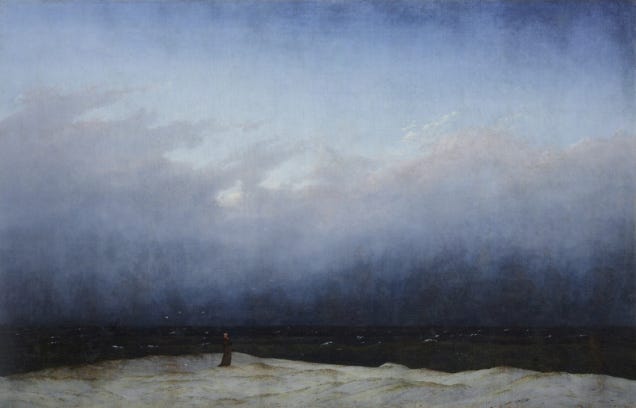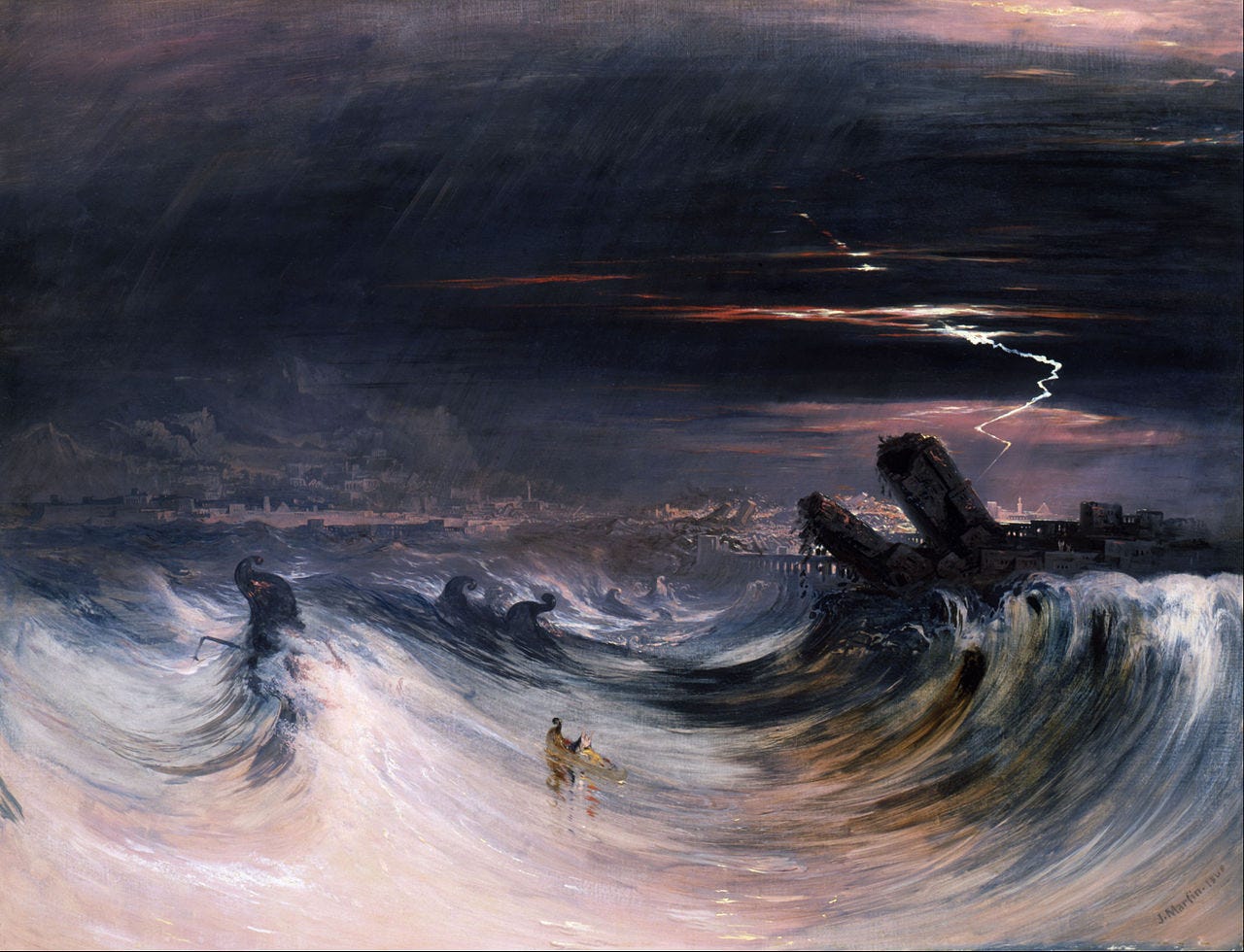'Grand Nostalgia' and the Temporal Injustice of 'Castle in the Sky'
THIS POST CONTAINS SPOILERS FOR THE FILM ‘CASTLE IN THE SKY’
But here is the truth of nostalgia. We don’t feel it for who we were, but who we weren’t. We feel it for all the possibilities that were open to us, but that we didn’t take.
Time is like wax, dripping from a candle flame. In the moment, it is molten and falling, with the capability to transform into any shape. Then the moment passes, and the wax hits the tabletop and solidifies into the shape it will always be. It becomes the past— a solid single record of what happened, still holding in its wild curves and contours the potential of every shape it could have held.
It is impossible— no matter how blessed you are by luck, or the government, or some remote, invisible deity gently steering your life with hands made of moonlight and wind— it is impossible not to feel a little sad, looking at that bit of wax, that bit of the past. It is impossible not to think of all the wild forms that wax now will never take.
—Cecil Palmer, Welcome to Night Vale
When I first watched the Studio Ghibli film Castle in the Sky, I really didn’t like it. It took me years to find the words for why.
Castle in the Sky is an animated film about the ancient floating city of Laputa. Laputa is said to be a utopia with advanced technology and valuable treasure, making it a prize for explorers of all stripes. The film’s protagonists have a jewel that can locate the city, so they are constantly evading ambitious raiders who hope to gain the power of Laputa for themselves.
But when the main characters finally arrive at Laputa, it turns out to be an abandoned wreck. Powerful yet dormant technology is the only lasting legacy of their once-mighty civilization. As the raiders vie for control of the city, they end up unleashing powerful forces they don’t understand. The subsequent struggle sends Laputa into a spiral of self-destruction.
I was really turned off by this whole final sequence. When I saw the dead remnants of Laputa mindlessly undoing itself, it filled me with a strangely unpleasant feeling. But most people I knew really liked the film, and I was unsure if they could even relate to the Big Feelings I remembered. It was not a wholly unfamiliar set of emotions, so I decided to think about past times I had experienced it.
I concluded that this emotion was related to nostalgia. Nostalgia has an innocuous connotation today, but our ancestors knew it as a danger: a form of depression that traps its victims in the past. Dangerous or not, characterizing nostalgia as a simple ‘throwback’ feeling does a disservice to such a complex emotion.
Nostalgia is interesting to me because it is such a contextual emotion. Anger is anger, but a nostalgic experience is a lot more dependent on peripheral feelings. One such feeling is lamenting a lack of awareness. When we remember our past nostalgically, we don’t just mourn the wild forms that it will now never take. We also mourn the fact that Past Us was not fully aware of the fleeting nature of these possibilities at the time, back when they could still be realized.
Sometimes this lamentation turns into resentment. Wistfulness becomes anger, anger towards a version of ourselves that no longer exists. You had no idea how lucky you were. Why didn’t you just seize every opportunity! If only I had been there.
But our greatest resentment is typically reserved for the present. We begrudge the blissful innocence of newcomers, who will never know how many wild forms the past could have taken. No one remembers the good old days.
These feelings are not exactly necessary for experiencing nostalgia, but they do amplify it. Nostalgia feels all the more tragic in the absence of proper appreciation, whether that be from past or future people. This is the basic ingredient for my core Big Feeling about Castle in the Sky. I call this core Big Feeling grand nostalgia.
Grand nostalgia is nostalgia at an epic scale. Imagine two nerdy teenagers fascinated by an Ancient Rome that they will never know. Their fascination stems from a desire to see both the greatness of Rome at its height and continuations of that greatness. They mourn not just the crystallization of a dead civilization, but all the other shapes it could have grown into when it was still vital and alive.
This feeling could be characterized as nostalgia, but that feels like a misnomer. Part of nostalgia is being fully immersed in a past experiential context. People cannot feel conventionally nostalgic for a context that they never lived through. I propose that grand nostalgia is a distinct emotion that is more vicarious and unknown.
Students of history will frequently feel grand nostalgia. The Ancient World is littered with faded monuments to past civilizational greatness: Knossos, the Parthenon, the Colosseum. Since our society runs on the idea of infinite continual progress, the loss of vital civilizational potential can be hard to accept. As long as a great civilization is remembered, the idea of it being restored to its former glory will always resonate.
Grand nostalgia has a “no one remembers the good old days” equivalent, which is civilizational information loss: when core aspects of the past are totally lost to time. In other words, it is a situation where literally no one remembers the good old days.
The cultural information loss is why I feel more ‘nostalgic’ about Mesoamerican civilizations than I do about Ancient Greece. While much of Greece’s knowledge was preserved by dutiful European monks and Arab scholars, events like the codex purges of King Itzcoatl, the Classic Maya collapse, and the inquisition of Spanish bishop Diego de Landa rendered much of Mesoamerican culture illegible in modern times. All we have are great ruins that suggest a similarly great lost culture.
But Ancient Greece has also had its fair share of civilizational information loss. A particularly resonant example is the City Dionysia festival, in which the best Greek playwrights of their day competed for the honor of Best Tragedy and Best Comedy. Since we have some record of these awards, we know of many lost plays said to be even more acclaimed than what we have now. The Clouds may be considered Aristophanes’ masterpiece today, but the only time he ever won first prize was with his now-lost play The Babylonians. All we have of The Babylonians today is a name and an echo.
While civilizational information loss can be severe, its extent is limited by the nature of ancient civilizations. Unless modern scholarship has seriously failed us, we live in the first civilization with access to industrial, atomic, and digital technology. As such, a past civilization will never be quite as captivating as a theoretical past civilization greater than our own.
But in fiction, there is no such limit. One of the hotter speculative fiction genres right now is deadciv fiction, which is characterized by a primary setting that sits atop the bones of a more advanced civilization.
Deadciv fiction is post-apocalyptic fiction’s mysterious cousin. While post-apocalyptic stories often highlight the Before Times of a collapse, deadciv settings are so distant (either culturally or temporally) that present characters have virtually no knowledge of the grandeur that preceded them. Deadciv fiction allows us to empathize with how Europeans in the Middle Ages might have longed for Ancient Rome, an age with more prosperity and technological advancement than their own.
Castle in the Sky is no exception, and the civilizational information loss of Laputa’s destruction cuts deep. While we as viewers do not dwell on the information contained, we are still made to feel as though a dozen Library of Alexandrias are burning. We do not need specifics to know that a treasure trove is disintegrating before our eyes.
But while grand nostalgia and civilizational information loss were huge parts of my Big Feelings about Castle in the Sky, there was a feeling I was missing. That missing feeling was a sense of injustice. Not only was the destruction repulsive, but the fact that it could even happen seemed deeply unfair.
I felt the same sense of unfairness at the end of Mike Duncan’s epic History of Rome podcast. After spending a year of my life learning about the halcyon days of Rome, it was difficult to hear about the empire being reduced to so little. The Romans of 200 BCE never would have let all this happen!
The unfairness in question is the temporal injustice of it all. Civilizations are group endeavors— each generation entrusting the invaluable fruits of their labor to the next. Those who helped build their civilization to new heights feel entitled to just as much of a say over its fate as those who led it into ruin. It feels unfair that people have no control over their physical legacy after they’re gone.
At least Rome had defenders— the case of Laputa feels especially unjust because no one is left to defend its legacy. At least if it was taken down by a worthy adversary, it would have died with dignity. But instead, Laputa is left to rot at the hands of entropic forces. It reminds me of a child accidentally stepping on an abandoned sandcastle.
Watching Laputa’s destruction was like watching a montage of children accidentally stepping on beautiful sandcastles. When combined with the childlike expectation of seeing a thriving Laputa in its glory, I felt a sense of despair. No temporal justice would rescue Laputa as it came crashing down to Earth.
Temporal injustice applies to far more than just civilizational ruin. It’s the fact that future generations are unable to influence our choices, which will continue to affect their world long after we’re gone. It’s the fact that some struggling meth addict would have thrived centuries ago in Victorian England, but he will never know it. It’s the fact that most people in human history never got the chance to learn how to read.
Grand nostalgia resonates with me because it serves as a reminder of the temporal injustice all around us. Sometimes we barely notice it; other times we grimace under its weight. It is possible to find temporal injustice in practically any situation.
Even plain nostalgia is a form of temporal injustice. When we resent the past versions of ourselves, the feeling typically has a little bit of injustice mixed in. How unfair that our good old days were wasted on Past Us. If only it were Current Us back then. If only.
I no longer dislike Castle in the Sky— it is a beautiful animated film that transformed an entire genre.1 But the fallen nature of the setting still casts a shadow. There is plenty of magic in the film, just like every other project from Studio Ghibli. But I can’t help but mourn the magic that has been lost forever.
And also steampunk!









Hi, Kevin. Thanks for the follow. I tried to reciprocate but Substack tells me that I can't do that. Just letting you know.